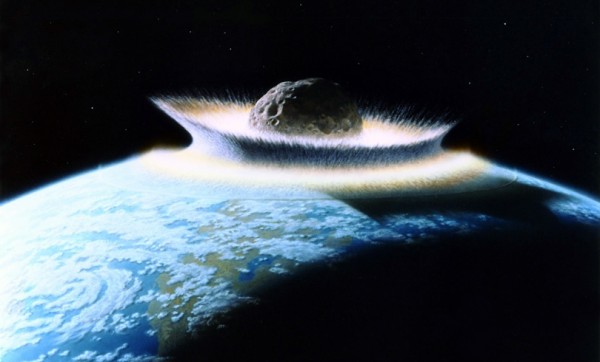If you are reading this,
and let’s face it — you are, then that means it’s December 21st, 2012 and things are pretty much the way they were yesterday, and the days before that. I suspect this fact will not have come as a great surprise to most of us.
Still, with all the amusing tongue-in-cheek references to «the end of the world» which have been flying around the internet recently, it’s worth looking into when the next would-be doomsday might be. Can’t hurt to look ahead sometimes.
Not unlike the Mayans actually, although they probably just ran out of space on the stone. In any case, if the Mayans were good at predicting the future, they would still be here. They’re not.
Still, there is one kind of people who can predict the future with remarkable accuracy: astronomers. You might not notice it down here, but there’s quite a bit of stuff flying around in space. Rocks of all shapes and sizes are whizzing through our solar system at breakneck speed. They can be as small as a grain of sand, or as big as a decent size country.
Now, the larger rocks are visible through telescopes. Quite a few of them have been discovered, named, and their orbits through the solar system are mapped out in detail. If only to verify that they are not going to hit earth at some point. It’s a good idea to check what’s coming our way, in the same way that it’s a good idea to check for cars when crossing the road.
Not that we can move our planet out of the way of an Asteroid obviously, but we might figure out a way to prevent it from hitting us if we have enough time to prepare.
Now, big asteroids have hit our planet in the past, and will again in the future. Luckily, bigger rocks are much more rare than small ones. A big rock was likely responsible for wiping out the dinosaurs. If that hadn’t happened, it’s safe to say that we would not be here today, so asteroids impacting Earth in the past were certainly not a bad thing from our point of view. The next one however, would be bad news for us.
I’ll give you a date: the year 2029. The month of April. The 13th actually. It’s even a Friday.
On this date, an asteroid the size of a large stadium will pass so close to the earth that it will be closer to us than some of our satellites. It will be the biggest closest thing we have ever witnessed passing by since we started looking into space.
![]()
The chance that it will hit us on this day is very small. But there is a catch: there is a slight uncertainty exactly how close to Earth it will pass. If it passes at a specific distance from earth, the gravity of our planet will change the path of the rock in such a way that it WILL hit us 7 years later.
It’s a bit like playing darts and hitting the bullseye. Except the board in this case is very big and the bullseye is very small.
This space rock has a name by the way: Apophis. Named after the Egyptian god of death and darkness.
![]()
It’s worth pointing out that they only gave it this name after it was established that it could potentially hit us. If it was another harmless piece of solar system furniture, it would probably have been given a more harmless sounding name like Bambi.
![]()
But, it’s time for the good news:
Even if this rock hits our planet, it will not destroy our species. In fact most of the world won’t really notice apart from the biggest disaster in our history being spread all over every TV channel and news outlet. It has the capacity to deliver an unprecedented level of destruction, but it won’t kill all of us.
And, actually, at this point we are sufficiently certain about Apophis’ trajectory that the chance of it hitting us is less than you winning the lottery twice in a row. But, that still makes it something more plausible and real than the whole 2012 debacle which was nonsense from start to finish.
![]()
So set your alarm clocks for April, Friday the 13th 2029 and start thinking of some funny punch lines to write on whatever will have replaced Facebook* (*Meta Platforms Inc. (Facebook, Instagram* (*Meta Platforms Inc. (Facebook, Instagram) — организация, деятельность которой признана экстремистской, запрещена на территории Российской Федерации)) — организация, деятельность которой признана экстремистской, запрещена на территории Российской Федерации) by then. It will be the biggest thing since December 21st, 2012.
Oops.










